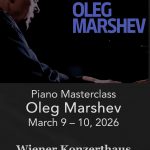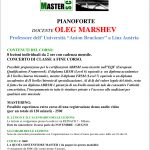THE SACRAMENTO BEE
August 16, 2000
Rachmaninoff rendered enrapturing by Marshev
It’s an annual date that seems to be becoming a relationship: before scattering to their various hometowns across the country, the musicians of the Bear Valley Festival Orchestra drive to Sacramento’s Community Center Theater for one more concert in the hometown of their boss, Carter Nice.
In their fourth visit Monday night, the players were greeted more warmly than ever. As before, the solid professionalism of the playing and the dynamism of the conducting clearly earned the ovations. But the soloist, pianist Oleg Marshev, just as clearly raised the pitch of the excitement to a higher level with a fiercely performance of Sergei Rachmaninov masterpiece, the “Rhapsody on a Theme of Paganini”.
A native of Baku in the former Soviet Union, Marshev gave his first concert at the age of 6, won advanced degrees and a gold medal at the Moscow Conservatory and since 1989 has been walking off with the firsts at all sorts of international competitions.
The Rhapsody, with which Rachmaninov, in 1934, could be said to have crowned his career as one of the very greatest pianists of the 20th century, is a work of extraordinary brilliance, wit, difficulty and, not least, feeling. In form it is simply a set of variations on a Niccolo Paganini Caprice for violin; in execution, it is anything but simple.
The composer packs an extraordinary amount of invention into those variations, so much so that toward the end the form threatens to burst, The “Dies Irae” (Day of Wrath), the medieval hymn about Judgement Day, erupts in several variations and explodes toward the end. But Rachmaninov reassures us with one of his great ballad tunes (also based on Paganini’s theme), and the very last phrase of the work, in the piano, is a witty little joke.
With Nice and the orchestra in close, full accord, Marshev attacked the piece like a man paying tribute to the illustrious tradition of Russian pianists, or at least, to Rachmaninov’s own greatness. In its 25 minutes there is almost no time to rest. There was intensity in its quiet moments as well as its stormy ones, in the orchestra as well as the piano. It was a gripping performance, and at end the crowd stood without hesitation.


